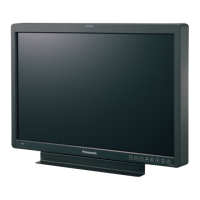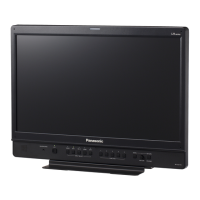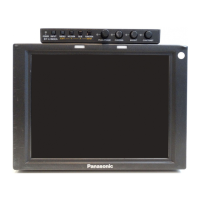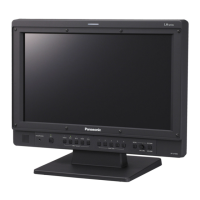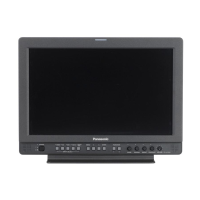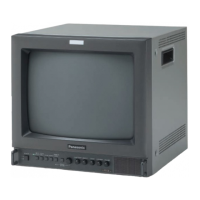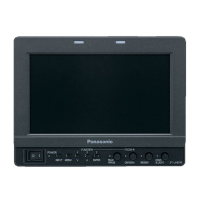Do you have a question about the Panasonic BT-LH2600W and is the answer not in the manual?
Identifies the product as an LCD Video Monitor.
Provides essential warnings for safe operation, including electric shock and fire hazards.
Details proper grounding procedures and ventilation requirements to prevent hazards.
Outlines FCC compliance and regulations for digital devices in the USA.
Lists critical safety directives for operating the equipment safely.
Advises on operating conditions, ventilation, and avoiding liquids to prevent damage or hazards.
Recommends using specified accessories and safe installation practices, including temperature limits.
Provides guidance on using the correct AC mains lead and fuse replacement.
Explains proper disposal of electrical and electronic equipment for environmental protection.
Details pixel characteristics, panel care, and potential image retention issues.
Lists the accessories included with the monitor for different models.
Describes the monitor's design, high-performance panel, and multi-format compatibility.
Provides detailed measurements of the monitor for installation and placement.
Introduces the monitor unit and points to specific panel and view details.
Illustrates and labels the components on the front and rear of the monitor unit.
Explains the function of power switch, input selection, and menu operation buttons.
Details the role of function buttons and the operation of picture adjusting knobs.
Describes SDI, VIDEO, Y/C, YPBPR/RGB, VD, and AUDIO terminals and their functions.
Explains the GPI and RS-232C input terminals for external control and synchronization.
Guides on attaching and connecting the power cord for different regions.
Provides instructions for connecting the AC mains lead for regions other than North America.
Explains the input signal status, picture adjusting knob status, and sharpness display.
Details the function display, audio level meter, and the main menu display structure.
Describes how to use the function display and audio level meter for monitoring.
Illustrates the main menu hierarchy and how to navigate through it using buttons.
Details the step-by-step process for displaying and selecting items within the main and sub menus.
Explains how to select and confirm setting values and exit menus.
Guides on how to save current screen adjustment values as user data.
Explains how to load previously saved user data or revert to factory settings.
Provides a visual map of the main menu hierarchy and all configurable options.
Lists specific settings within MARKER, VIDEO CONFIG, SYSTEM CONFIG, FUNCTION, GPI, INPUT SELECT, AUDIO, CONTROL, and HOURMETER.
Describes various marker types like 16:9, 4:3, and area markers with their settings.
Explains settings for background brightness and the center marker display.
Illustrates different 16:9 markers (vertical bar) and 4:3 markers (dotted line).
Shows examples of area markers, Vista/CNSCO markers, and the center marker.
Covers gamma selection, film gamma modes, and color temperature adjustments.
Details sharpness settings, IP mode selection, monochrome conversion, and anamorphic display.
Explains selecting color temperature and entering WB adjustment modes.
Describes how to adjust gain and bias for color temperature settings.
Covers contrast/backlight assignment, backlight level, and sub window type selection.
Details WFM/menu/rotary position settings and user data saving/loading.
Explains how to assign functions like HV DELAY, AUTOSETUP, and MARKER to function buttons.
Describes how to enable or disable the display of assigned functions.
Lists conditions under which specific functions like HV DELAY, AUTOSETUP, and GAMMA SELECT are disabled.
Shows the messages displayed when specific function buttons are pressed.
Explains HV DELAY display modes and the SUB WINDOW function for split-screen viewing.
Details the FULL and PART modes for the SUB WINDOW function and their precautions.
Describes how to use the Wave Form Monitor (WFM) function and its usage restrictions.
Explains using PIXEL TO PIXEL for pixel-accurate display and PIXEL POS for positioning.
Describes how to assign functions to GPI terminal pins for external control.
Lists operations that cannot be performed with GPI under specific signal conditions.
Details selecting input formats for VIDEO, Y/C, NTSC, YPBPR/RGB, COMPONENT LEVEL, RGB SYNC, and COMP.
Covers AUTOSETUP, H/V POSITION, PHASE, CLOCK, and WXGA/XGA for PC input.
Explains selecting speaker output, audio channels for left/right speakers, and embedded audio.
Details how to display the audio level meter and switch channels.
Describes LOCAL and REMOTE operation modes, including control lock.
Explains the display of power distribution, LCD backlight, and fan operation times.
Details the function and operating conditions for each GPI terminal pin.
Lists specific functions like MARKER, INPUT SEL, SCAN, MONO, and their GPI assignments.
Shows the pin arrangement for RS-232C terminals on PC and monitor sides.
Explains command format, response formats, and communication conditions for RS-232C control.
Details commands for input selection (IIS) and image quality adjustments (VPC, OBO, QCT).
Covers commands for marker settings (DMK), gamma selection (MGM), and sharpness settings (VPC).
Explains commands to query input selection (QIS) and image quality adjustment values (QPC, QBO, QCT).
Details commands for querying marker (QMK), gamma (QGM), sharpness (QPC), aspect (QAS), and format (QFR).
Lists common error displays like Inverter error, Fan stop error, and their recommended solutions.
Provides guidance on cleaning, periodic maintenance, and inspection times for parts.
Details power supply, consumption, dimensions, weight, operating conditions, and panel size.
Lists all input connectors (VIDEO, Y/C, SDI, GPI, RS-232C) and signal level specifications.
Shows a table detailing compatible signal formats across VIDEO, Y/C, SDI1, SDI2, YPBPR, RGB-VIDEO, and RGB-COMP inputs.
Provides notes on specific signal compatibility, such as 1035/59.94I and 1035/60I inputs.
